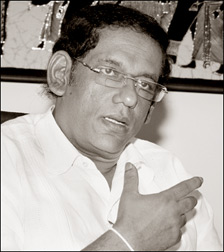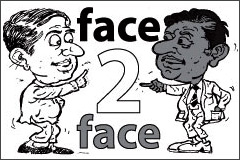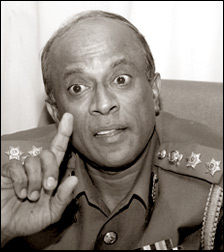Drivers be more careful!
 |

Interviewed by Dhaneshi YATAWARA
[email protected]
|
 |
Minister Mano Wijeyeratne, Chairman of Parliamentary Select
Committee
|
The Parliamentary Select Committee to look into the
alarming increase in road accidents issued its report last
week. Hence, ‘Face 2 Face’ talked to the authorities
on the present situation we are facing. |
Senior Superintendent of Police Ranjith Gunasekara - Police
spokesman
Pix: Kavindra Perera |
Road system can't absorb the vehicle load
|
|
Drivers need to be more careful |
Reporting accidents to Police, a must |
|
Our road conditions are not for speed driving
|
l What is the present situation?
Minister Mano Wijeyeratne, Chairman of Parliamentary Select
Committee
Figures from 2006 - 2007 show the number of accidents has decreased.
But this is simply because of 'on the spot' insurance schemes. People
don't report it to the police. Instead they prefer to call up the
insurance agent and get the matter settled. According to our reports
around 150 accidents are reported daily causing a loss of 5 - 6 precious
lives. At the death of the breadwinner the dependents left behind become
helpless without any source of income.
Senior Superintendent of Police Ranjith Gunasekara - Police
spokesman
It is not satisfactory. Daily we hear different kinds of accidents.
And, among them many fatal accidents as well. Drivers need to exercise
utmost care. Our road conditions do not support speed driving. Being a
tropical country we very often get rains and roads are slippery and the
possibility of skidding is high. So the most advisable thing would be to
be more careful while driving.
l Compared to the past have we gone from bad to worse?
Minister Mano Wijeyeratne, Chairman of Parliamentary Select
Committee
We have gone from bad to worse. Our modes of transport have changed.
Day by day the conditions seem to be getting worse unless we bring in
strong legal and ethical systems to be strictly enforced.The change from
the public to private transport was cited as a major cause for
increasing traffic leading to accidents. It was also observed that some
of the pedestrians do not observe road rules properly, especially when
crossing the roads.
Senior Superintendent of Police Ranjith Gunasekara - Police
spokesman
It has turned from bad to worse. But we need to correct this. With
the growth of the population more vehicles are on the roads. Society is
changing. Hence, the transport systems also need to change accordingly.
l What are the causes?
Minister Mano Wijeyeratne, Chairman of Parliamentary Select
Committee
Driving has to be taken as a very responsible day-to-day activity. In
the present situation, the road network in the country cannot absorb the
increased number of vehicles. Roads are poorly designed. Road
infrastructure is without adequate pedestrian facilities such as
foot-walks, hard shoulders and crossings are major contributory factors
to accidents. Drivers are not competent enough, they are not well
trained. Today's conductor works as the driver tomorrow. This is very
scary.
Senior Superintendent of Police Ranjith Gunasekara - Police
spokesman
Mainly, negligence of drivers. Everyone is in such a hurry that
nobody cares for the other. On the other hand, drunken drivers are
another major cause to this increased number of accidents. Amidst all
this, the number of vehicles is also increasing, Specially, if we
consider night time driving mostly it is negligence that leads to
accidents. Most of the roads we travel on are not of good standard.
People are not obeying road signs. And we must keep in mind that
accidents may happen at anytime. There could be unavoidable accidents as
well.
l How do you think controlling traffic could benefit the country?
Minister Mano Wijeyeratne, Chairman of Parliamentary Select
Committee
The era of obeying the law is of the bygone days. So stressing on
this fact is timely. Obviously this would be beneficial. In the last 20
years from 1987 to 2007, around 1,120,848 accidents were reported in
which over 40,000 people died and 320,000 injured out of which 68,440
were seriously injured. More than three fourth of such deaths were of
young adults within the age group of 20 - 55 years. The cost of
accidents for the last 10 years was over Rs. 100 million. On the other
hand, it is a waste of resources. Reports indicate that of the total
fuel consumption only 65% is used effectively and the balance gets
wasted due to traffic congestions. So controlling the traffic and making
it more effective is highly beneficial to the country.
Senior Superintendent of Police Ranjith Gunasekara - Police
spokesman
Definitely. We can put a fullstop to wasting fuel, time and money. It
would definitely contribute in a positive way. Road rules are there not
only to control people but also to protect each and everyone's right to
travel. It is a fundamental right. People must understand this. If
someone is disobeying road rules and giving a difficult time for another
person it is a violation of fundamental rights.
l Is Colombo notable among all the other main cities in the number
of road accidents?
Minister Mano Wijeyeratne, Chairman of Parliamentary Select
Committee
Colombo does not have major accidents. We can only see minor
accidents and breaking of road rules. Statistics have shown that 59% of
road accidents occur in the Western Province, specially in A1, A2,A3 and
A4 roads within a radius of 50km from Colombo city. We should also keep
in mind that with the new highways and expressways coming up in the
future, special care has to be exercised to avoid fatal accidents on
those roads.
Senior Superintendent of Police Ranjith Gunasekara - Police
spokesman
We don't see fatal accidents within the City limits. Mainly, minor
accidents, which are either unavoidable or occur due to disobeying road
rules. On the main roads like Colombo-Kandy Road, Colombo-Galle Road, we
have fatal and complicated accidents.
l Increased road accidents - Is it a new development or is it due to
long term negligence?
Minister Mano Wijeyeratne, Chairman of Parliamentary Select
Committee
I have to agree about the long term negligence. Our society has got
used to deaths for the last thirty years with the war. The moment we see
or hear an accident we don't feel the gravity of it unless there is a
seriously injured person or a dead person. The road shoulders should be
cleared for pedestrians regularly and it should be made mandatory in all
road improvement projects. The mechanism for detecting, prosecuting and
punishing offenders of traffic laws needs to be strengthened. We can't
blame the Police since they are also facing a shortage of manpower and
vehicles, equipment and new technologies. It restricts their capacity in
efficiently countering traffic offenders.
Senior Superintendent of Police Ranjith Gunasekara - Police
spokesman
Nobody has done a proper research on the trend and pattern of
accidents. So, I just can't say whether this is a newly developed trend
or a long term one though we see an increase in the number of accidents.
l What would you suggest to control road accidents?
Minister Mano Wijeyeratne, Chairman of Parliamentary Select
Committee
The committee recommended the drafting of a national policy to
prevent traffic accidents as a matter of priority. We have also
recommended a three year probation period after obtaining the licence.
And also a marking system where every accident gives a driver a minus
mark until the point at which the licence will be cancelled. We need
these strict monitoring systems since innocent passengers are at a risk.
We have also suggested that a police report is mandatory before the
insurance claim is made. This will in time create a better network.
Children under 8 years must be kept at the back seat. Seat belts a must.
And also in a hit and run accident the medication bills have to be paid
by the driver and the owner himself. We have also introduced a scheme
under which Rs. 250,000 will have to be paid for each passenger by the
vehicle owner as compensation in an accident. The insurance premium can
go up but this will protect all parties concerned in the case of an
accident. These are some of the recommendations made.
Senior Superintendent of Police Ranjith Gunasekara - Police
spokesman
Our drivers must be very careful. Driving is a very responsible
activity of our lives. Drivers must be extra careful, specially during
night time driving. Either they get drunk or they just simply fall
asleep while driving. I have seen in several foreign countries,
specially on highways where people travel for days, unusually large
signs on the sides of the road indicating speed. Then I found out that
the authorities have put up boards like that since it is human nature to
forget things easily. While you are driving you may fall into a deep
thought or get into very interesting chit-chat or simply get bored of
long hours of driving. So, your mind can easily divert its focus from
driving. Seeing these signs reminds the driver of his or her duty. In
Sri Lanka we can get the help of radio stations. Specially during the
night time they can be reminded by addressing drivers to take a short
break if they are feeling sleepy etc. These are very small things but
can serve well.
l Aren't heavy vehicles becoming a problem to road users?
Minister Mano Wijeyeratne, Chairman of Parliamentary Select
Committee
Yes, it has an impact. So we have made recommendations like
restriction on entering cities, night driving for container carriers and
restricting the importation of oversized vehicles. The Container
Drivers' Association has suggested that the Colombo Port be required to
work at night for container cargo and this suggestion could be
implemented.
Senior Superintendent of Police Ranjith Gunasekara - Police
spokesman
Well heavy vehicles can cause problems. But, these are mainly
lorries, containers, bowsers that transport goods in bulk. Their
contribution to the economy is very high. That cannot be disregarded. |

